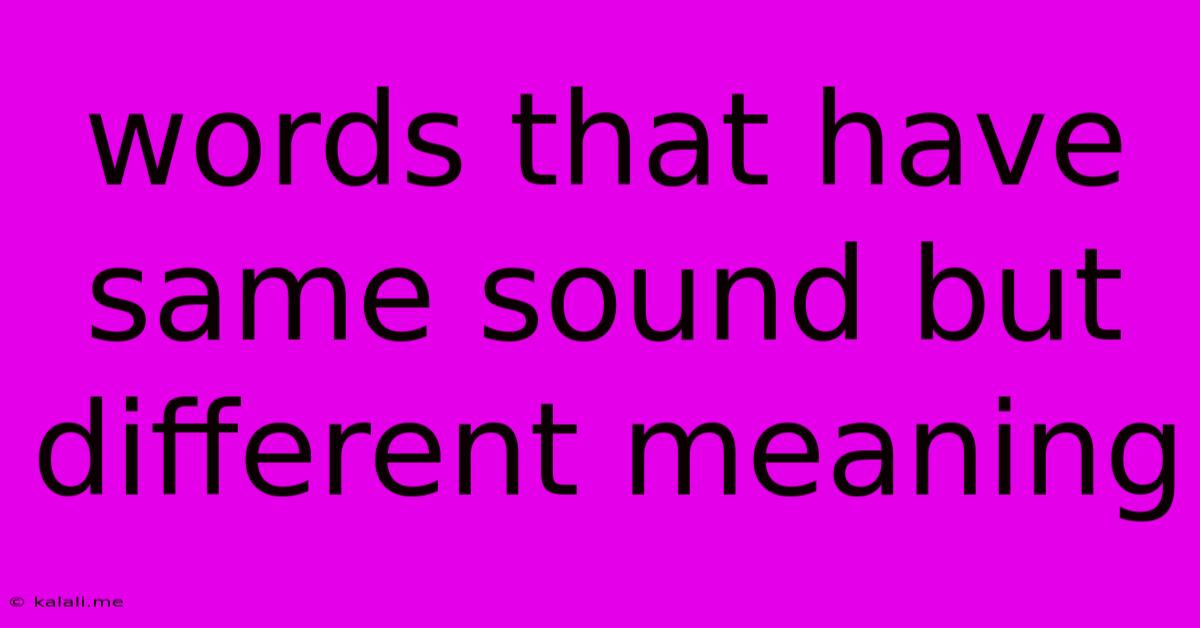Words That Have Same Sound But Different Meaning
Kalali
Jun 03, 2025 · 3 min read

Table of Contents
Decoding Homophones: Words That Sound Alike, But Mean Different Things
This article explores the fascinating world of homophones – words that share the same pronunciation but have different meanings, spellings, and origins. Mastering homophones is crucial for clear communication, both in written and spoken English. Understanding their nuances can significantly improve your writing and prevent embarrassing misunderstandings. Let's dive into some common examples and strategies to avoid confusion.
What are Homophones?
Homophones are words that sound identical, regardless of their spelling or meaning. They often cause confusion, especially for non-native English speakers, and can lead to grammatical errors if not used correctly. Think of them as auditory twins with distinct personalities. The challenge lies in selecting the appropriate word based on the intended context.
Common Examples of Homophones:
Here's a list of some frequently encountered homophones, categorized for easier understanding:
1. Affect vs. Effect:
- Affect: Usually a verb meaning "to influence" or "to produce a change in." Example: The weather affected our travel plans.
- Effect: Usually a noun meaning "a result" or "consequence." Example: The effect of the medicine was immediate. (It can also be a verb meaning "to bring about," but this usage is less common.)
2. There, Their, and They're:
- There: Indicates a place or position. Example: The book is over there.
- Their: Shows possession. Example: That's their car.
- They're: A contraction of "they are." Example: They're going to the party.
3. Hear vs. Here:
- Hear: To perceive sound with the ears. Example: I can hear the birds singing.
- Here: Indicates a place or position. Example: Put the box here.
4. See vs. Sea:
- See: To perceive with the eyes. Example: I can see the ocean.
- Sea: A large body of salt water. Example: The sea is vast and deep.
5. To, Too, and Two:
- To: Indicates direction or purpose. Example: I'm going to the store.
- Too: Means "also" or "excessively." Example: I want to go too. The coffee is too hot.
- Two: The number 2. Example: I have two apples.
6. Your vs. You're:
- Your: Shows possession. Example: Is that your book?
- You're: A contraction of "you are." Example: You're very talented.
7. Its vs. It's:
- Its: Shows possession. Example: The dog wagged its tail.
- It's: A contraction of "it is" or "it has." Example: It's raining outside.
Strategies to Avoid Homophone Errors:
- Proofread carefully: Always review your work to catch errors. Reading aloud can help you hear potential mistakes.
- Use a dictionary or thesaurus: If you're unsure about the correct word, consult a reliable resource.
- Context is key: Consider the meaning of the sentence to determine the correct homophone.
- Practice regularly: The more you write and use these words correctly, the more natural it will become.
Conclusion:
Understanding and mastering homophones is an essential aspect of developing strong English language skills. By carefully considering context and utilizing available resources, you can confidently and correctly incorporate these words into your writing and speech. With consistent practice and attention to detail, you can overcome this common linguistic challenge and significantly improve the clarity and precision of your communication.
Latest Posts
Latest Posts
-
Make The Selection Box A Different Coclor Gimp
Jun 05, 2025
-
How Far Can You Drive On A Donut Tire
Jun 05, 2025
-
Yellow Flag For Esp32 In Com Port
Jun 05, 2025
-
How To Remove Stripped Screws From Shower Strainer Cover
Jun 05, 2025
-
Should I Clean My Web Sql Data
Jun 05, 2025
Related Post
Thank you for visiting our website which covers about Words That Have Same Sound But Different Meaning . We hope the information provided has been useful to you. Feel free to contact us if you have any questions or need further assistance. See you next time and don't miss to bookmark.